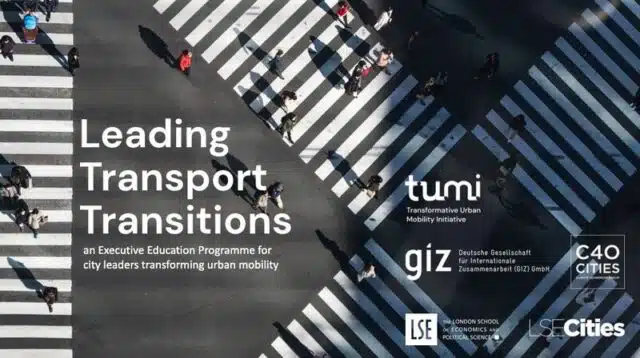Trainings & E-Learning
Leading Transport Transitions. An Executive Education Programme for city leaders transforming urban mobility
Overview
Leading Transport Transitions is a tailored leadership programme to support city leaders transform urban mobility. Recognising unprecedented motorisation, persisting congestion, new risks of social exclusion and record levels of transport-related carbon emissions, this executive education programme helps city leaders build context-specific strategies for transitioning to affordable, safe, low-carbon and inclusive urban mobility. The programme is organised and delivered by a strategic partnership between the Transformative Urban Mobility Initiative (TUMI), the C40 Cities Climate Leadership Group, and the London School of Economics and Political Science (LSE). The collaboration brings together TUMI‘s expertise in facilitating urban mobility transformation and LSE’s commitment to policy-oriented research and education for the betterment of society as one of the foremost social science universities in the world.
Download the flyer here: Leading Transport Transition
Details
Leading Transport Transitions provides policy and leadership training for urban mobility leaders in emerging and developing economies. It has been designed for 15-20 mayors and high-level urban transport leaders to advance on their knowledge and skills in the analysis, planning and delivery of progressive urban transport policies, programmes and projects. The programme will also strengthen individual leadership skills to enable urban transport transitions in their cities and to operate more effectively in politically and institutionally complex urban environments. This executive programme will be delivered through a modular approach combining an upfront online module with a follow-up in-person module in the vibrant city of London, renowned for its innovative transportation solutions such as cycle hire shemes & the congestion charge, in spring 2024. This unique gathering will facilitate the exchange of experiences, foster the development of innovative mobility strategies, and empower participants to strengthen their leadership skills. To delve deeper into the program’s scope and objectives, kindly refer to the attached brochure.
Teaching Format:
Hybrid
Starting Date:
Scheduled
Language:
English
